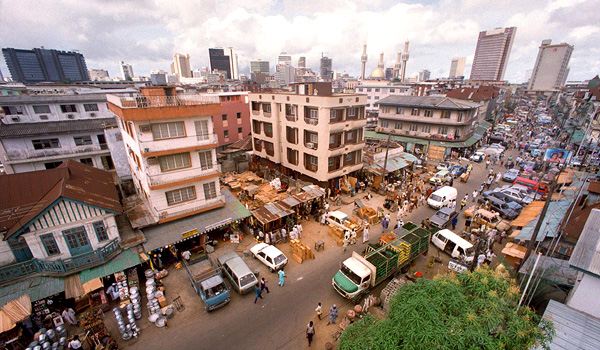Though it is bigger in size than China, India, Europe and the United States combined and is projected to claim seven of the world’s 10 fastest growing economies by 2015, Africa is represented by just seven cities on the Economist Intelligence Unit’s list of what will be the world’s most competitive cities in 2025.
The rank of these seven on the bottom half of the 2025 City Competitiveness Index and generally modest performance in the various categories scored show just how much work African cities must do to make it into the upper echelon of global magnets for business, talent, and livability.
By the middle of this century, seven out of 10 people will be living in cities, a trend that has led global business to begin planning strategy from a city, rather than a country, perspective, the EIU says. Rates of urbanization in Africa are the highest in the world, with 66 percent of the continent’s population expected to live in cities by 2020 alone.
The 2025 City Competitiveness Index is part of an EIU report titled “Hot Spots 2025: Benchmarking the Future Competitiveness of Cities,” which was commissioned by Citigroup. The 120 cities listed were selected based on regional diversity, economic importance and population size.
The EIU defines competitiveness “in its broadest form” as a city’s ability to attract capital, businesses, talent and people. The index benchmarks the competitiveness of cities at two points in time: today and in 2025, and scores each city across eight categories: economic strength, physical capital, financial maturity, institutional character, social and cultural character, human capital, environmental and natural hazards and global appeal.
A key finding of the report is the fact that “very few of the most competitive cities can do without three things: a high level of income, favorable demographics and access to quality seaports.” At the same time, the most significant advantage of the cities at the top of the index is their ability to develop and attract talent.
African cities continue to face the biggest competitiveness challenges of all regions. South Africa provides the continent’s three top performers: Johannesburg (ranked 66th globally), Cape Town (77th) and Durban (95th), while concentrated on the bottom of the index are Cairo and Alexandria, Egypt, (106th and 117th, respectively), Nairobi, Kenya (112th), and Lagos, Nigeria (119th).
Building globally competitive cities was the subject of a week-long, high-level leadership seminar hosted in March 2012 by the World Bank Institute, in collaboration with South Africa’s National treasury, the South African Local Government Association and the University of Cape Town.
As an example of Africa’s unique urban challenges, the institute pointed out that South Africa remains marked by apartheid’s legacy of duality legacy of apartheid.
“The current shape of many South African cities reflects apartheid planning whereby high density communities remain far from economic opportunities. Residents in these communities spend close to one-third of their incomes on arduous commutes. Instilling the vision to reshape cities, increase the development of affordable mass transit, and improve infrastructure to reduce travel time and cost are key considerations for sustainable urban planning,” it said.
The EIU’s competitiveness index is not to be confused with MasterCard’s African Cities Growth Index, which includes 19 sub-Saharan Africa cities ranked according to their economic growth potential between 2012 and 2017.
The bottom line for both, as well as for the World Bank Insittute’s seminar participants, is essentially the same, nonetheless: innovation and creativity, coupled with leadership and vision, can instigate change and transform the continent’s urban landscape.













